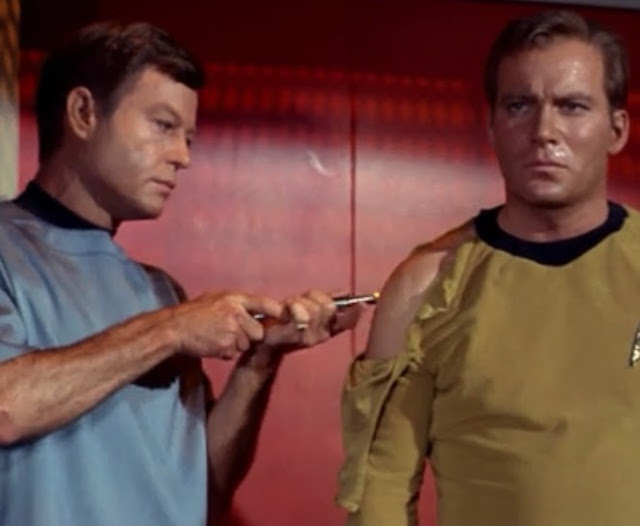In
a previous post, I listed a number of science fiction technologies used in the original Star Trek series and the progress our current society has made towards making them real. I also commented on how quickly we might achieve them.
I was just watching some reruns the other day...sorry, let me rephrase that in contemporary language in ephemeral tech language... I was watching a few of them them on Netflix (how long will the tech assumptions behind that phrasing last) and I realized that I had left out a number of things, some very obvious, some that seem like throwaways now. They are hidden, outside of the script but somehow mostly necessary assumptions for the plot.
- needle-less injections - Someone needs to be sedated? They're writhing in distress? With the 'hypospray' (which I suppose is hyp
erdermic), no need to be restrained when you don't have to find a vein. Just inject them without a needle via some transcutaneous mesh.
In some sense, the current
transdermal patch effectively delivers chemicals to the blood stream but has its own limitations. Both aren't particularly effective for medications that need to be administered directly to the bloodstream for quick systemic dispersal (putting a bolus in your butt is slower release to the blood stream).
- earth diseases entirely solved, alien ones solvable in days with at-hand tech - every other episode someone contracts an alien disease. The other episodes some one is phasered in the face or breaks a leg, but they walk out of sick bay as chipper as ever. Medical science slowly does this, almost like this ST tech list, some things get solved perfectly (antibiotics?), some there's progress (chemotherapy), and some you solve well by cheating smart (colonoscopy screening). But in the show, any new unsolvable medical problem takes a long 48 suspenseful plot hours to solve.
- anti-gravity - elevators, walking on flat floors. That's just crazy. The only 'anti-gravity' is gravity from the other direction. But really, they need seat-belts even with anti-grav floors. For something like this which is technically impossible, a lot of tech cheating can go a long way
- deflector shields, force fields - a prison cell is fronted by it seems a painful invisible electric field. And the outside of the ship is protected from alien explosions (and the often forgotten cosmic particles and dust hit at interstellar speed). I presume if you can do this for a door way, you could do it for the outside of a ship so that the same tech would work for detention as well as protection.
- automatic pocket doors - doors are more privacy devices than security. They all seem to know when you're going to walk into any particular one otherwise like kids playing at the entrance to a grocery store, every single door would whoosh open as you walk along the hallway.
- bloop-bleep sounds - special futury sounds that alert you to danger or notification. These sounds were invented for the show (the communicator opening sound, the door opening whoosh).
Door opening sound
Red Alert
Tricorder scanning
OK, these are just fun. They're pretty much 1960's '101 Fun Experiments with Transistors!!'.
- the real time vital stats monitor - this is entirely doable, or even done, today. Maybe just badly. We can totally do this now. Get those ST set designers to work on the UX for the ICU/OR patient monitors!
Maybe the fancy scifi bit is in not having loads of tubes all trailed all over your body. That's practically possible now with bluethooth wireless.
- 'subspace' communication - this is very inarticulately presented in the shows. Sometimes they can communicate instantaneously over long distances, sometimes it is just somewhat faster than the ship. The physics of this is unclear to me. Somehow I expect that for the ability to transfer knowledge, there is some physics theorem that says that it is restricted by the same principles as the speed of light (i.e. if you could transfer knowledge that fast, you could have consequences (I don't know!) that would be equivalent to faster-than-light travel.
(oh almost forgot, bluetooth earpiece, pfft done that already)
Frankly there is so much in the original series that I'm sure I've missed even some big ones.
---
Much of these imaginations were on purpose, but then some were just natural tweaks (needleless injection) or even unconscious assumptions (antigravity).
As an aside, social progress is interesting to watch, both in the invented extended world timeline of ST (TOS, TNG, DS9, Voy, Ent) and the real one. It's almost grating how tin-eared white-male-centered TOS appears now in comparison to the less presumptuous later series. Ent itself isn't as embarrassing as TOS even though Archer is (again the captain) an alien-femalizer and his two male subordinates are always whooping it up with the brosplaining... ok maybe it is intentionally embarrassing (but Ent is only 150 years in the future, 150 years behind TOS you'd think there'd be a little more progress)?








